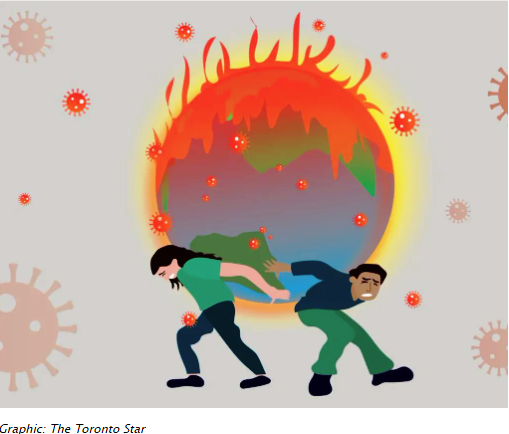Mental Health and Climate Change: An Unseen Connection
The world is facing the heat, literally! Climate change is now a global crisis- rising temperatures, wildfires, floods and droughts. It is not just an environmental issue, but a humanitarian one too. It has far reaching consequences like economic strain, migration, lowering social capital, and traumatic events and these can exacerbate existing mental health conditions, leading to depression, anxiety, substance abuse and even suicidal behaviour.
Mental health comprises an important component of health and climate change is causing serious and adverse side effects to it. Droughts can lead to impaired mental health and stress while increased frequency of climate change related disasters could lead to posttraumatic stress disorder, adjustment disorder and depression. Changes in climate and global warming are forcing people to migrate, what is now known as “climate refugees” which can lead to acculturation stress. Effects of climate change can also be seen in increased rates of physical illnesses, which can have secondary effect like psychological distress.
The Rising Threat
Globally there are nearly 1 billion people living with mental health conditions. A 2022 report by the Intergovernmental Panel on Climate Change (IPCC) revealed that rapidly increasing climate change poses a rising threat to mental health and psychosocial well-being.
Physiologically, people’s bodies aren’t built to handle heat beyond a combined measure of heat and humidity, of around 35° Celsius/about 95° Fahrenheit. Heat tends to make people more irritable. There’s growing evidence now that shows that when temperature increases, it affects people’s bodies, their performance on various tasks, as well as overall coping mechanisms. It is also seen that rising temperatures can lead to increased aggression.
The Unequal Burden
The mental health impacts of climate change are unequally distributed with certain groups disproportionately affected depending on factors such as socioeconomic status, gender, and age. Climate change affects many of the social determinants that are already leading to massive mental health burdens globally. Older people and people of colour affected from mental health issues in greater danger of social isolation, lower social support and poor living conditions.
The Global Impact
The World Health Organization (WHO) carried out a survey of 95 countries in 2021 where it found that only 9 countries have so far included mental health and psychosocial support in their national health and climate change plans and that only 2 % of the health budgets are spent on mental health. The impacts of climate change are increasingly part of our daily lives, yet there is very little dedicated mental health support available for people and communities dealing with climate-related hazards and long-term risk. There is a large gap between mental health needs and the availability and accessibility of the mental health systems and services to address them. Increased natural disasters also lead to compromised health care services, limiting access to health care services and an increased load on health service infrastructure and providers. In low and middle income countries, 3 people out of 4 do not have access to the needed services.
The Rise of Eco-Anxiety
Eco-anxiety, as described by the American Psychiatric Association, is a chronic fear of environmental doom and is on the rise. It may arise from the awareness of a rising risk of extreme weather events, losses of livelihood or housing, fears for future generations, and feelings of helplessness and can lead to symptoms such as panic attacks, loss of appetite, irritability, weakness and sleeplessness. Although doctors still hesitate to consider it as a diagnosable condition, mental health experts use it in the field of Eco-psychology, a branch that deals with people’s psychological relationships with the rest of nature and how this impacts their identity, well-being, and health. This is more intensely felt among the younger generation, first responders to climate disasters, scientists and activists who are exposed to the information about the threats. A global survey in 2021 published in The Lancet, found that more than half of people aged 16–25 felt sad, anxious, or powerless, or had other negative emotions about climate change.
The Way Forward
WHO recommends five important approaches for governments to address the mental health impacts of climate change:
- Integrate climate considerations with mental health programmes.
- Integrate mental health support with climate action.
- Build upon global commitments.
- Develop community-based approaches to reduce vulnerabilities.
- Close the large funding gap that exists for mental health and psychosocial support.
Climate change and mental health are interconnected issues that need our immediate attention. By understanding this connection and taking appropriate action, we can help protect those most at risk and create a healthier, more sustainable world for all.



